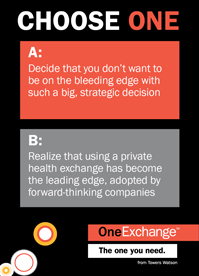Fee-For-Service to Value-Based Payment Transformation: Landscape Overview - Part 1
Fee-For-Service to Value-Based Payment Transformation: Provider Strategies and Readiness - Part 2
|
Fee-For-Service to Value-Based Payment Transformation: Integrating Medicare and Commercial Payors While Embracing Medicaid - Part 3
|
Fee-For-Service to Value-Based Payment Transformation: Successful Population Health Management - Part 4
The Neuroscience of Gratitude
You don't know what you don't know about the new neural knowledge.
|
Have an article to contribute or words of wisdom for the Philosopher's Corner?
|
|

Click here
to learn more about One Exchange and Towers Watson.
|
|
|

There's a lot in store for you this issue, from articles on stress and gratitude to coverage of topics like strategic growth and an overview of considerations regarding use and risks of embarking on medical marijuana from a business perspective.
Thanks to all who completed the WHCMAA survey! Your feedback and ideas will help guide the Association in its efforts to be constantly evolving to address your interests and meet your needs over time. More to come......
Z. Colette Edwards, WG'84, MD'85
Managing Editor
To learn more about Colette,
click here.
|
 The President's Desk
|

We have all heard about the "shift from volume to value." Providers have many names for this, including value-based payment, population health, accountable care, shared risk, network tiering, patient-centered care, and consumer-driven care.
As a consultant advising providers and payers on this transition, the term I prefer is value-based competition. It's an odd term, because in a competitive market, competition is always "value-based" - consumers make decisions based on cost and perceived quality. I often return to an insight from Professor Jack Hershey, who said healthcare is like any other sector of the market........... except for the impact of insurance, physicians, government payments, regulation, and the moral issues associated with life and death decisions.
Read more.
|
 The Philosopher's Corner
The Philosopher's Corner
|

This eclectic standing column features insightful musings, words of wisdom, life lessons, and stepping stones to business success. This month's philosopher is Jon Yeatman.
Read more
.
We'd love to hear from you and invite you to click here to participate in future editions. Column Editor: Z. Colette Edwards, WG'84, MD'85.
|

In our initial discovery (part 1) of what compels a person to behave or act we examined how motivation, intention and autonomy influences, predicts, and drives behavior. Uncovering that people behave based on a need that can be influenced, predicted and driven by personal-choice seems obvious. But if this is so clear, why is behavior change so hard to understand and motivation so hard to stimulate? In the second part of this series will look at what it takes for a program to motivate action and inspire people to perform behaviors and reach their desired outcome.
Read more.
|
|
|
While the potential returns from the medical marijuana business may be enticing, participation in the industry is not without risk, especially given the federal prohibition of marijuana.
Read more
.
|
|
|

A four-part series, "Caregiver Stress in Healthcare" explores the sources of stress in today's healthcare profession, the impact of stress on caregiver professionals - both professionally and personally - and examines methods to address these challenges to improve healthcare efficacy and healthcare providers' well-being.
Read more
.
|
|
|
Research shows benefits to health and well-being for individuals when practicing gratitude. These positive outcomes will make you stand up and take notice - regardless of your professional role as a provider, caretaker, leader, or an individual contributor.
Read more
.
|
 Strategic Growth in Healthcare Delivery: It's Not Just Size that Matters Strategic Growth in Healthcare Delivery: It's Not Just Size that Matters |

Healthcare merger and acquisition (M&A) activity has been growing rapidly over the last several years, hitting a record high in volume and value of transactions in 2015. Much of this activity has been driven by a desire for scale, with a belief by many healthcare leaders that "bigger is better" by reducing unit cost through economies of scale, increasing access and capacity to deliver care and, more recently, leveraging joint investments to strengthen providers' capabilities in the transition to value. Growth is no longer about the size of the organization in revenues or beds, it is about lives served and margin generation in order to reinvest. Now, scale must be relevant scale. More importantly, growth must be strategic growth. Read more.
|
|

|

Seven members of the Wharton Global Health Volunteers (WGHV) teamed up with Swasti, a health resource center established in 2002 focused on achieving public health outcomes for those who are socially excluded and underprivileged. Swasti develops, pilots, and scales innovative models to address the behavioral, social, and systems-based determinants of health.
The Wharton team traveled to Bangalore, India to develop a business plan for Swasti's FDA-approved device i-calQ, which attaches to a smart phone and tests newborns' blood for congenital hypothyroidism that, if not treated in the first month of life, can lead to mental retardation and significantly decreased IQ.
Read more
.
|

 What Leaders Can Learn from Feeling like a "Middle"
|
Barry Oshry's work on levels of organizational structure provides a window into the challenges and opportunities to advance change in academic medicine. In his book, Seeing Systems: Unlocking the Mysteries of Organizational Life, Oshry sketches out four roles in any organizational system - Tops, Middles, Bottoms, and Customers. A key element of Oshry's theory is that all roles sometimes experience being pulled into another role group.
Read more
.
 The Future of Healthcare Depends on Who You Ask - How to Succeed in Healthcare - Part 2
|

There's a huge disruption taking place in the healthcare industry that is impacting the clinical and corporate worlds. This disruption entails moving from a fee-for-service, volume-based healthcare delivery model to a value-based system. Healthcare and corporations alike are struggling with how to respond. A focus on employee health status is one innovative approach to build the heart and soul of a value-based system.
Read more.
Back to Top
|
Disclaimer: The opinions expressed within are those of the authors and editors of the articles and do not necessarily reflect the views, opinions, positions or strategies of the Wharton School and/or the University of Pennsylvania, and/or their respective organizations. Publication in this e-magazine should not be considered an endorsement. The
Wharton Healthcare Quarterly e-magazine and WHCMAA make no representations as to accuracy, completeness, currentness, suitability, or validity of any information in this e-magazine and will not be liable for any errors, omissions, or delays in this information or any losses, injuries, or damages arising from its display or use.
|
|
|
|
|
|